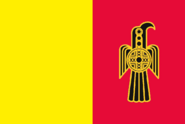Featured language
|
| Luthic |
|---|
| Lûthica |  Flag of the Luthic-speaking Ravenna | | Pronunciation | [ˈlu.ti.xɐ] |
|---|
| Created by | Lëtzelúcia |
|---|
| Date | 2023 |
|---|
| Setting | Alternative history Italy |
|---|
| Native to | Ravenna; Ferrara and Bologna |
|---|
| Ethnicity | Luths |
|---|
| Native speakers | 149,500 (2020) |
|---|
| |
|---|
Early forms | |
|---|
Standard form | Standard Ravennese Luthic (Lûthica)
|
|---|
Dialects |
- Upper Luthic (Altalûthica), Ferraresi Luthic (Lûthica Estense)
- Standard Bolognese Luthic (Lûthica Bolognesa)
- Paulistan Luthic (Lûthica Paülista)
|
|---|
|
|
|---|
| Official status |
|---|
Recognised minority
language in | |
|---|
| Regulated by | Council for the Luthic Language |
|---|
| Language codes |
|---|
| CLCR | qlu |
|---|
| BRCL | luth |
|---|
The areas where Luthic (red and orange) is spoken. | | This article contains IPA phonetic symbols. Without proper rendering support, you may see question marks, boxes, or other symbols instead of Unicode characters. For an introductory guide on IPA symbols, see Help:IPA. |
Luthic (/ˈluːθ.ɪk/ LOOTH-ik; endonym: Lûthica [ˈlu.ti.xɐ]) is an Italic language that is spoken by the Luths, with strong East Germanic influence. Unlike other Romance languages, such as Portuguese, Spanish, Catalan, Occitan and French, Luthic has a large inherited vocabulary from East Germanic, instead of only proper names that survived in historical accounts, and loanwords. About 250,000 people speak Luthic worldwide.
Luthic is the result of a prolonged contact among members of both regions after the Gothic raids towards the Roman Empire began, together with the later West Germanic merchants’ travels to and from the Western Roman Empire. These connections, the interactions between the Papal States and the conquest by the Germanic dynasties of the Roman Empire slowly formed a creole as a lingua franca for mutual communication.
As a standard form of the Gotho-Romance language, Luthic has similarities with other Italo-Dalmatian languages, Western Romance languages and Sardinian. The status of Luthic as the regional language of Ravenna and the existence there of a regulatory body have removed Luthic, at least in part, from the domain of Standard Italian, its traditional Dachsprache. It is also related to the Florentine dialect spoken by the Italians in the Italian city of Florence and its immediate surroundings.
Luthic is an inflected fusional language, with four cases for nouns, pronouns, and adjectives (nominative, accusative, genitive, dative); three genders (masculine, feminine, neuter); and two numbers (singular, plural).
Previously featured languages • Nominate a featured language |
ISO codes on KreativeKorp
|
The Linguifex wiki supports KreativeKorps initiative on assigning ISO-codes for conlangs, the ConLang Code Registry! Add your language to the list here. If your language is on Linguifex, let us know! |
Helping out
|
- Not sure where to start?
- Adding content
- If you want to help but you're not sure where to start, try improving the various stub articles by expanding them.
- Add a new, needed category.
- Another helpful activity would be to check the list of wanted pages for frequently linked-to articles that don't exist yet.
- Providing linguistic and phonetic information.
- You can find a list of needed templates here.
- Wiki maintenance
|
|
|
Featured picture
|
Avendonian (autoglossonym: avendoniano; Avendonian: [avendoˈni̯ano]) is a West Germanic language, with strong influence of Vulgar Latin. It is the result of a prolonged contact among members of both regions, after West Germanic merchants began travelling to and from the Western Roman Empire. These connections—and the conquest by the Germanic tribes of the northern skirts of the Roman Empire—slowly formed a creole for mutual communication. Eventually, permanent settlements were established in what would become modern-day Avendonia, where Avendonian is primarily spoken, with official status.
See more: Avendonian
|
Create a language!
|
Do you want to create a language? It can take a lot of work to make it presentable but the results are often amazing! To make your own language you need to decide on:
- The phonology - the sounds of the language.
- The grammar - the framework of the language.
- The vocabulary - the words and dictionary of the language.
Enter a title in the box below to start creating your language.
For more information on linguistics see our guide and the linguistics section.
|
Create a word!
|
Linguifex houses not just your language, but a dictionary similar to Wiktionary, namely, Contionary. Here you can create and share the vocabulary and details of your constructed language! Write your word (no capitals) and get going!
For more information on the Contionary, see our words and introduction!
|
|